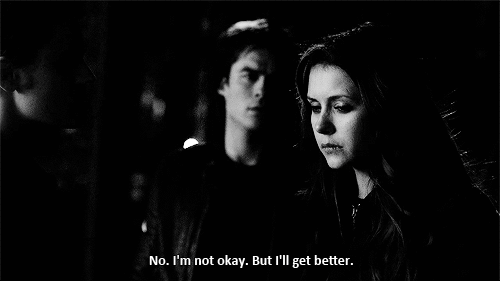Few people have a well-rounded and in-depth understanding of mental illnesses. The knowledge that most people think they have on the subject is often massively distorted by the media.
Generally speaking, most media outlets only uphold the most negative stereotypes that exist for the mentally ill. These stereotypes are often based on little to no fact value and strongly derived from hearsay misconceptions.
This type of representation leads to an unfavorable view of those who are mentally ill and causes the public to fear and look down upon those who struggle with their mental illnesses.
Some of the most common falsehoods that circulate around the mentally ill are that they are violent, unpredictable, incurable and different from “ordinary” people. While these frequent media clichés are possible, they are not always the case.

GIF courtesy of tumblr.com
When it comes to violence, U.S. News said that “studies show that not only are individuals with mental illnesses less likely to commit violent crimes, they’re actually more likely to be victimized.”
The idea that all mentally ill people are criminal or violent is held up in many popular films and TV shows in the U.S.
In fact, a study led by Don Diefenbach, a professor of mass communications at the University of North Carolina – Asheville, found that characters who were identified as being mentally ill were 10 times more likely than other characters to commit a violent crime. Furthermore, these same characters were “10 to 20 times more likely to commit a violent crime than someone with a mental illness would be in real life.”
It is far too common that an “unstable” and “dangerous” person escapes from an asylum, only to murder innocent people or cause terror to the community. Is it possible that this could happen? Yes. Are all people who go to an asylum going to do this? No.

GIF courtesy of tumblr.com
The media also tells us that mental illnesses make people unpredictable and that we should fear them at all times.
According to Otto Wahl, Ph.D, a professor of psychology at University of Hartford, the vast majority of people with mental illness are normal people who go to work and try to enjoy their lives. There is no evidence supporting the claim that all mentally ill people are unpredictable.
What is even more ludicrous about this cliché is that unpredictability in “normal” people is typically considered a positive attribute. When people think of an unpredictable friend, they picture someone showing up unannounced and suggesting a road trip. When people think of an unpredictable lover, they picture spontaneous kisses and adventurous dates.
Yet when people think of an unpredictable friend, lover or otherwise, who also happens to be mentally ill, they picture aggression, danger and unavoidable fear.

GIF courtesy of tumblr.com
Even when people with mental illnesses are portrayed in less negative ways in the media, it is rare to see characters who have any sort of progress.
In the real world, most mentally ill people seek out therapy, medication or other forms of aid, in order to improve or lessen the burden of their mental illness. The notion that people simply live with it and allow it to consume their lives could not be further from the truth.

GIF courtesy of tumblr.com
Possibly the most outrageous bromide of the mentally ill in the media is that they are in someway physically different from other people and that mental illnesses can be easily noticed.
Mental illnesses are called such because the issue occurs only in your mind, not your physical, outside body. Whether a person is severely depressed, struggles with bipolar disorder or is dealing with anxiety, they are going to look the same physically as everyone else in the world.

GIF courtesy of tumblr.com
Since far too many people think that mental illnesses are so easily spotted, it is common for sufferers to go on unnoticed and undiagnosed.
Many of his fans could not have predicted the crippling depression that Robin Williams was facing before his suicide. He was able to construct a believable facade in his films and during his public appearances. Many people do the same and remain under the radar of friends and loved ones.

GIF courtesy of tumblr.com
No matter the type of mental illness someone may have, it will vary from person to person. People are affected by disorders in different ways a develop different severity levels.
When we source our knowledge of mental illnesses to strictly the media, we are disrespecting the people who suffer from these diseases. While we can’t stop the media from promoting these ideals, we can stop ourselves from being foolish enough to believe them.




